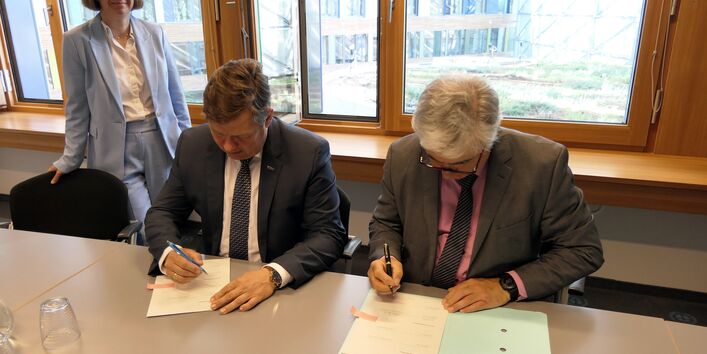New collaboration between Merseburg University of Applied Sciences and German Environment Agency
Today's signing of the cooperation agreement between the Merseburg University of Applied Sciences and the German Environment Agency (UBA) lays the foundation for their cooperation in the fields of the environment and digitalisation – on a scientific level and for the strengthening of regional networks of excellence. The occasion and central element of this partnership is the establishment of the National Centre for Environmental and Nature Conservation Information (umwelt.info) as a new UBA branch office in Merseburg.
The German Environment Agency (UBA) implements a broad range of measures to fully exploit and actively promote digital innovations to solve environmental challenges. By establishing the umwelt.info data and information platform, UBA is developing a new tool for the German information landscape in the fields of environment and nature conservation. The establishment of umwelt.info in the central German coal-mining district will also make the centre a regional driver of a sustainable industrial society.
“The umwelt.info platform will help to make environmental and nature conservation information easier and quicker to find. We are creating the basis for informed decision-making in environmental politics. It also promotes the broad use of data that can provide the foundation for new ideas and visions of business models in the areas environment, climate action, and resource conservation. We are glad to have the Merseburg University of Applied Sciences as an important strategic partner in the region,” said Dr Wolfgang Scheremet, Head of the Central Office Division at UBA.
The cooperation agreement underscores the cooperation and ongoing networking in the construction of umwelt.info, the synergies of research competence and capacities as well as the fostering of young research talent. Possible areas of cooperation are joint scientific events, reciprocal participation in research projects in the form of study visits by scientists and doctoral students, the establishment of dual study courses and the supervision, e.g. of doctoral theses, student papers and dissertations.
Merseburg University of Applied Sciences and its some 3,000 students represent the centre of applied research in southern Saxony-Anhalt and offers the best conditions for successful, practice-oriented higher education studies. Located in the middle of an industrial and cultural region steeped in tradition, the institution sees itself as application-oriented, a place where teaching, research and transfer activities are an interplay between economy and ecology and between technology and culture. Its interdisciplinary research priority areas ”Sustainable processes” and "Digital Transformation" address two central challenges facing society at precisely the interface which is the focus of tasks which UBA also targets.
"We are delighted that UBA has settled in Merseburg and agreed to strategic cooperation. As a University of Applied Sciences, we benefit from UBA's specialist knowledge and can jointly play to our strengths in teaching and research. With our expertise in the disciplines of environment, technology and chemistry, as well as in areas of information and cultural sciences, we wish to support UBA on various issues and contribute to the cooperation for our mutual benefit," said Prof. Dr. Markus Krabbes, Rector of Merseburg University of Applied Sciences. "This applies in particular to the wide array of activities promoting the development of our university campus with regard to climate change mitigation and sustainability," explained Dr Karen Ranft, Chancellor of the Merseburg institution.
Geographical proximity will facilitate joint transfer efforts: UBA's National Centre for Environmental and Nature Conservation Information is expected to move into new premises in Merseburg's city centre in autumn 2022. Up to 25 new UBA employees are to work there by the end of 2023.
National Centre for Environmental and Nature Conservation Information
Data and information on the environment must be easy to find, readily available, valid and transparent. To meet this demand in the future in light of ever-increasing amounts and formats of data, UBA is establishing the National Centre for Environmental and Nature Conservation Information with the associated web portal umwelt.info at its Merseburg site. The new portal, currently under construction, will serve as a single central access point in Germany for publicly available information on environmental issues. The information offered will include environment-related data, metadata, services, reports, research findings, expert opinions and educational materials as well as information on legal and administrative regulations, funding programmes or proceedings conducted by the environmental and nature conservation authorities. The data and information will be made available to all citizens, science, research and educational institutions, businesses and industry, as well as public administrations in a way that is appropriate for the target groups. The main support for the project comes from the Federal Ministry for the Environment, Nature Conservation, Nuclear Safety and Consumer Protection (BMUV) with funds provided for in the provisions of the Structural Reinforcement Act for Mining Regions.
Associated content

von links: Dr. Karen Ranft, Kanzlerin der Hochschule Merseburg; Prof. Dr. Markus Krabbes, Rektor der Hochschule Merseburg; Dr. Wolfgang Scheremet, Leiter des Zentralbereichs im Umweltbundesamt

von links: Dr. Wolfgang Scheremet, Leiter des Zentralbereichs im Umweltbundesamt; Dr. Karen Ranft, Kanzlerin der Hochschule Merseburg; Prof. Dr. Markus Krabbes, Rektor der Hochschule Merseburg
